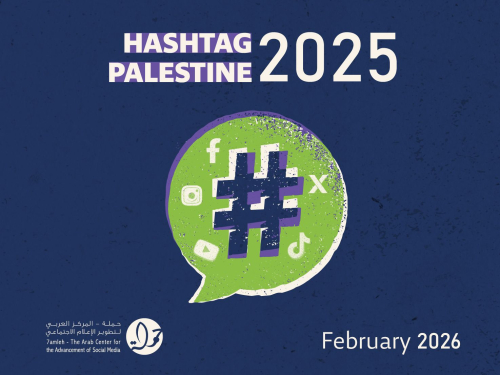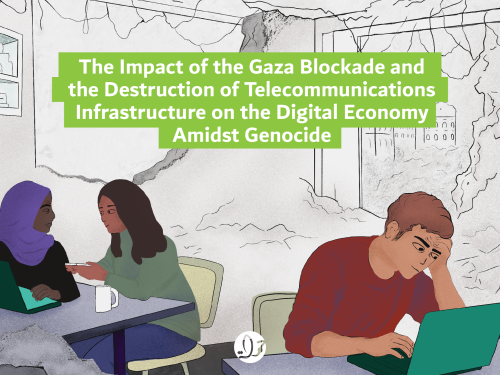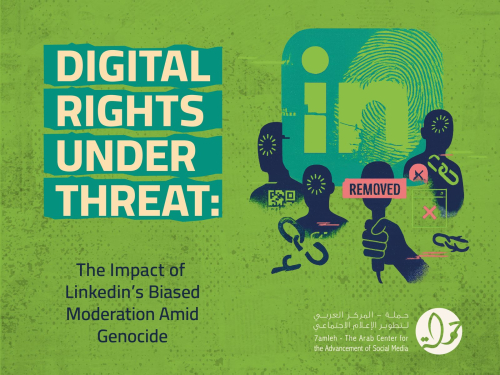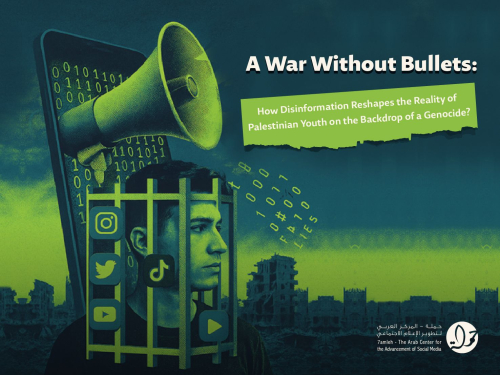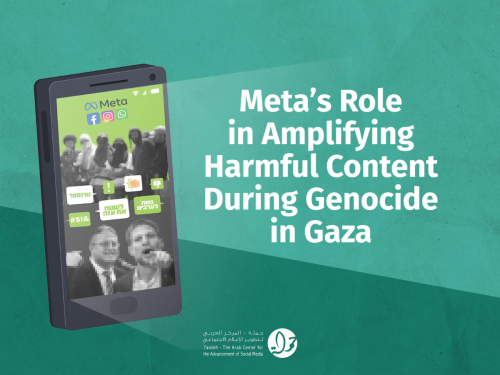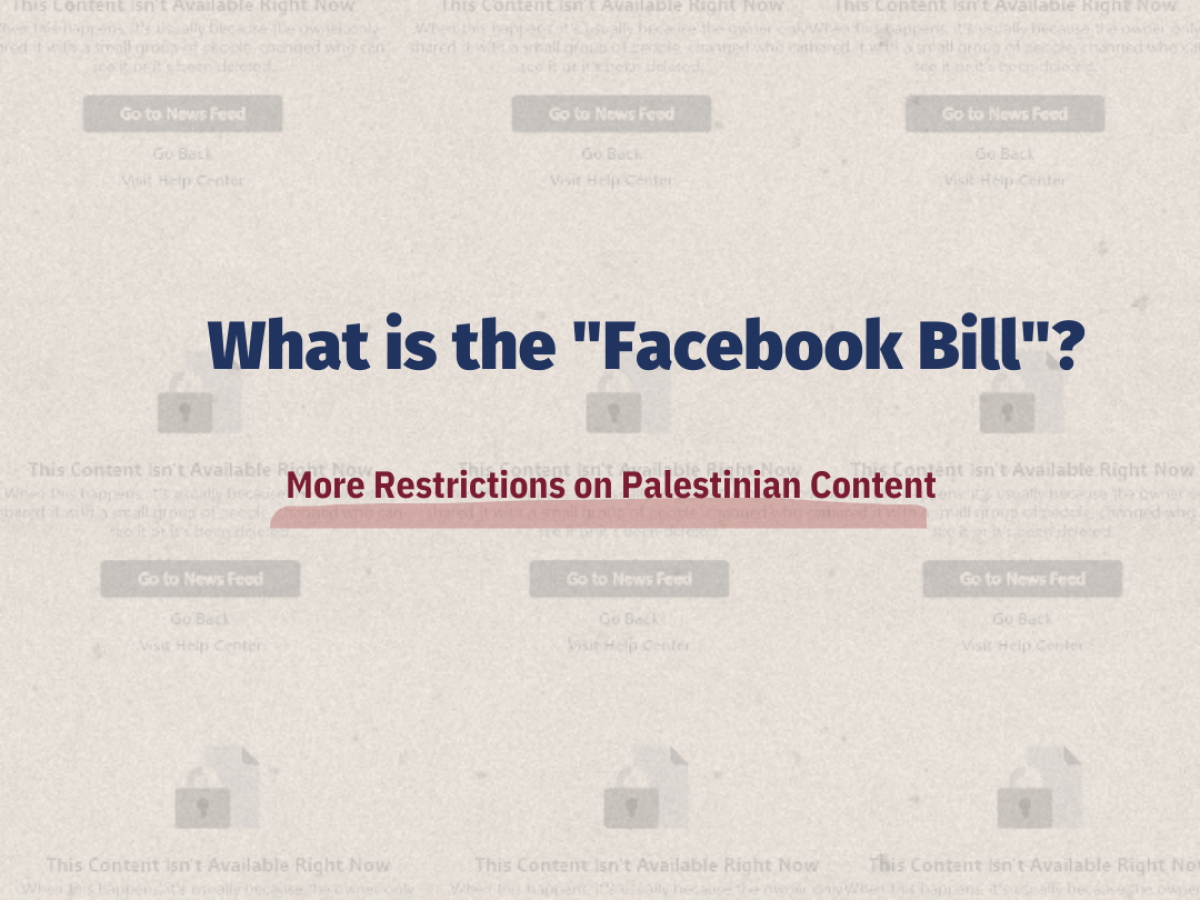
On 27 December 2021, the Israeli Ministerial Committee for Legislation unanimously approved the bill for Preventing Incitement on social media, 2021. This law seeks to regulate government involvement in removing content or restricting access to content on online platforms.
According to the bill, a district court judge will be authorized, at the request of the prosecutor on behalf of the State, to issue a warrant instructing the publisher of content, or the owner, administrator or operator of an internet website, including an application, free or paid, in which content was published, to remove the content from the website. Furthermore, the court will be authorized to instruct the provider of an information retrieval service on the internet (Search Engines), such as Google, not to enable the retrieval of content for which the warrant was issued.
The aforementioned warrant will be issued after the court is convinced that the publication of the content constitutes a criminal offense and that its continued publication constitutes a real possibility of harm to a person's safety, to public safety or to the state's security. This bill applies to any publication, regardless of whether the server is located in Israel or outside of Israel. This bill has no territorial limitation, and theoretically, warrants may be addressed to any website whose published material invokes allegations of an offense, and when the publication may bring about harm to the safety of a person, to public safety, or to state security.
The main purpose of the bill, as one can infer from the preamble, is to improve the State of Israel's capacity to address harmful content published on the internet, in view of the global trend of rising violence and "incitement to violence and terror" in various countries across the world. Therefore, a decision was made to expand the legal parameters in light of this trend. The issue at hand is an additional tool which does not seek to replace any of the current legal tools. Neither the bill nor the preamble provide sufficient factual data that makes a compelling case as to why the current legal tools do not allow for the fulfillment of the purpose of the bill. The bill does not purport to address all types of harmful content, such as harm to a person's reputation or privacy, as long as such harm does not amount to a real threat or harm to a person's safety, public safety or state security. The bill does not specify the criminal offenses to which it supposedly intends to apply.
Furthermore, the bill contains no statement of intention to confront the phenomenon of anonymous or artificial publications, such as "bots" when the perpetrator of the alleged offense cannot be located, and therefore a quick sanction is required without a criminal process. Therefore, even when the identity of the publisher is known, the bill still allows the option to remove content from an internet website regardless of the possibility of indicting or not indicting the publisher. The sanction put forward by the bill is “removal” rather than “deletion” or “partial restriction,” which prima facie denies the possibility of anyone in the world being exposed to the content, even if such content does not constitute an offense where they live.
7amleh-The Arab Center for the Advancement of Social Media, which works, inter alia, for promoting digital rights and protecting freedom of speech on the internet, objects to the bill in its entirety and hereby issues an alert as to its expected harm, especially to Palestinian citizens and residents of the state of Israel and residents of the occupied Palestinian territory (OPT) as well. The offenses of incitement to violence and terror are offenses for which an assertion as to the commission of the offense requires extreme prudence and the use of all the legal tools which criminal law grants to publishers. Allowing for a court ruling in a flash legal procedure in relation to specific content that allegedly amounts to "incitement to violence or terror", opens the door to government censorship of any content which exposes repressive policies on the part of the authorities, presents evidence of human rights violations, exposes violence by Israeli security forces, objects to policies of belligerent use of force etc. In the Israeli Palestinian context, it is clear that the freedom of speech afforded to those who oppose the Israeli occupation of the West Bank and Gaza Strip and those who object to the State's policies in general and in particular during times of emergency, are the first to be harmed by the bill.
Forcing an individual to defend their publications in court, facing the State and giant corporations, restricts one's will to exercise their right to freedom of speech and may create a chilling effect by which individuals would rather refrain from expressing views or implicitly consent to the removal of content, when having to come up with the financial and psychological resources necessary for a confrontation with the legal system and the parties to legal proceedings. Citizens and residents may apply excessive self-censorship fearing that their views may drag them into legal proceedings vis-a-vis the State and giant media companies.
This bill can only be viewed as one which seeks to redraw the boundaries of legitimate and illegitimate discourse, not based on the rules of criminal law and the procedures thereof, and not based on the legal criteria put forward by the courts as to the restriction of freedom of speech. There is no doubt that while the virtual sphere has provided accessible platforms for the appropriate and effective fulfillment of individual freedom of speech, we are also witnessing the ease with which these platforms can be abused. However, Israeli criminal law has known, and still knows how to address the concerns which are raised in the bill, and the State, as well as any victim, has access to various legal actions which can ensure the protection of the interest of upholding public safety and security without the need for additional legislation.
As explained below, our view is that the bill violates the constitutional freedom of expression in a disproportionate manner and generates constitutional difficulties, in the substantial aspect as well as the procedural aspect. Given that there are plenty of legal and other arrangements in Israel which allow for the filtration of harmful content, it is not clear what the proposed legislation purports to achieve, if not the expansion of the scope of harm to the right to political freedom of speech, especially that of political opponents of policies in Israel.
The means available to the state nowadays for upholding the purpose of the bill
The preamble of the bill presents no compelling factual data which could justify the need for regulating the issue of removing harmful content, nor does it answer the question why the currently available means are unsuitable for addressing the phenomenon of harmful content. If one notes the severe expected harm to the right of publishers to freedom of speech, it would have been appropriate at least to answer the question why there is an urgent need to expand the legal toolbox for restricting freedom of speech on the internet.
Legal enforcement carried out by the State Attorney’s cyber department:
Since 2015 a cyber unit within the State Attorney's office has operated an enforcement mechanism that also handles offenses in cyberspace. This department is also active against harm to minors, sexual harassment such as the circulation of sexual photos and footage, harmful publications against public servants, security offences and offences related to incitement, violations of election laws and more.
The purpose behind the establishment of this department, which was named the “unit” until recently, is entirely identical to what one sees in the current bill, which is "addressing crime and terror in cyberspace.” The cyber department functions in two different courses: the formal course (enforcement) and the voluntary course.
The legal enforcement course:
Legal action in this course includes sending demands on behalf of the cyber department to the service providers and content platforms, regarding the removal of content, blocking access to content or filtering it out of search engine results. All this is based on the instructions of the Law on Authorities for the Prevention of Committing Crimes Through Use of an Internet Site, 2017. This law authorizes the court to issue warrants for preventing the commission of certain offenses, and for preventing users from being exposed to certain offenses committed on websites. The law does not apply to all offenses and lists several offenses ranging from gambling and illicit games, the publication of prostitution services, drug-related offenses, harmful substance abuse, and terrorist group activity on the internet, all according to the Counter-Terrorism Law, 2016.
As part of this course, in 2020, 35 requests were filed with the courts, pertaining to 3,624 different internet websites whose servers are situated outside of Israel, access to which was to be blocked according to the requests. Most of the requests pertain to gambling websites - 17 in total, websites which publish sex services - 16 in total, and two requests regarding websites featuring obscene material or pedophilia. 31 of these requests were accepted by the court and four were deleted by the State Attorney after the desired outcome was attained during the court hearing.
In addition, the cyber unit acts vis-a-vis content and service providers at the level of updates on the need for removing content which constitutes violations of statutory instructions, such as gag orders regarding the names of suspects or complainants in sex offenses, the enforcement of injunctions issued based on the Elections Law (Propaganda Methods), 1959, as well as other publications which run contrary to the instructions of the law or to judicial gag orders.
The voluntary course:
Another course in which the State has acted diligently for the removal of content which it deems harmful is the voluntary one. Within this course, the cyber unit contacts internet companies, mostly social networks, the Google search engine and service providers, to report alleged offenses carried out as part of a publication, or to report publications which amount, in the unit’s view, to violations of the terms of service put forward by the website or the internet service provider. The unit’s message to service providers and websites is a "recommendation”, and platforms may exercise full discretion in deciding how to act in view of the unit's report. However, the data presented below shows that online platforms tend to accept the recommendations of the cyber department, and remove or intervene in content, in the overwhelming majority of reports. The alternative enforcement course, according to the Israeli State Attorney's reports, is an alternative enforcement tool to the criminal one when it is impossible to identify the perpetrator of the offense, locate them or indict them, and as a complementary tool when there exists classical criminal enforcement. One should note that the voluntary course of action has been criticized by human rights groups which have appealed to the High Court of Justice (HCJ) to instruct the State to terminate it. In case 7846/19, Adalah vs. State Attorney - Cyber Unit, 12.04.21; the Cyber Unit’s activity in the aforementioned voluntary context is discussed. These human rights groups, Adalah and the Association for Civil Rights in Israel (ACRI), claim that reporting criminal offenses allegedly committed on the internet to online platforms is taking place without authorization by law, which violates the constitutional right to freedom of speech. The court rejected the petition both in limine and in substance, after ruling that the department, according to the information disclosed, is acting within its authority and that no data were presented to show that the department is acting against human publishers rather than, for example, bots.
Most of the intervention by the cyber department is in the realm of incitement and security, and therefore the bill is redundant
While the purpose of the cyber unit is to provide protection from harm to a person's safety or well-being, in practice and according to the data published by the cyber department, as well as the State's position as presented in the aforementioned HCJ case, the overwhelming majority of the department's activity in the voluntary context takes place against publications which allegedly invoke allegations of supporting a “terrorist organization” or allegations of “incitement”. Therefore, according to the court, its activity is legal. However, this begs the question, why has the State seen fit to ground the unit’s authority in primary legislation, if not to justify more severe violations and stronger intervention?
From data published by the State Attorney in a summary of 2020, it follows that in 2020, 144 criminal cases were opened by the cyber unit with respect to offenses which took place in cyberspace, compared to just 57 cases opened in 2019. For the sake of comparison, in 2016, only 16 cases were opened. 7% of the criminal cases involved alleged security offenses in 2020, and 5% of this involved incitement. These data are relevant for the enforcement policy course. In the voluntary course, the data attest to excessive activity in the context of incitement and terror offences, which is disproportionate to the percentage of indictments on these charges.
In the preliminary response submitted to the HCJ on behalf of the State, as well as according to State Attorney publications, it follows that most of the communication in this course regards publications of organizations defined as terrorist organizations or publications of incitement to terror or violence. Thus, for example, in 2019, 76% of the removal requests regarded publications of organizations defined as “terror” organizations, and 22% of the requests regarded publications allegedly containing contents which may amount to an offense of incitement to violence or terror.
It follows from reports by the cyber department, that not only does most of the activity in the voluntary course take place in the aforementioned field of incitement and terror, but also that most of the requests submitted by the department are accepted and the relevant contents are removed. For example, and as stated by the HCJ in its decision in the Adalah case, in 2016 the department sent 2241 reports to online platforms, in which 76.5% of the publications were removed, partially or entirely. In 2017, 12,351 Publications were reported, in which 88% of the publications were removed. In 2018 14,283 publications were reported, in which around 92% of the publications were removed. In 2019, 19,606 publications were reported, in which around 90% of the publications were removed.21 It follows from the State Attorney report for the year 2020 that 4.458 requests were submitted to online platforms for removing or blocking contents, and 88% of these were submitted to Facebook. The 2020 report does not provide information as to what percentage of these requests were accepted by the platforms.
One concludes that in the given situation not only are there sufficient tools for addressing the publication of allegedly harmful contents, but also that there is seemingly a large extent of cooperation between the State and online platforms, which is suspicious in itself, and this should be addressed. However, the aforementioned data suffice to show that no tools are missing from the State’s toolbox for intervention in internet content, and it would be better to increase transparency in the State’s use of these tools rather than attempting to add more tools and enhance the scope for violation of political liberties.
The violation of the right to freedom of speech is disproportionate
The right of access to cyberspace is derived from the constitutional right to freedom of expression, and is also a manifestation of the right to personal autonomy afforded to internet users. Blocking access to internet websites is a well-known method used by many non-democratic regimes which seek to block their citizens’ access, or exposure to content deemed inappropriate by the regime. The right to freedom of expression has been recognized as a constitutional right in Israeli law. The fulfillment of the right to freedom of expression is a prerequisite for the fulfillment of the other liberties, especially the political ones among them. Israeli court rulings have recognized the right to freedom of expression as a constitutional right. The violation of the right to freedom of expression does not merely amount to a violation of the rights afforded to the publisher or to the person expressing themselves. It is also a violation of the rights afforded to the users of various platforms in cyberspace, who have the right to be exposed to the expression and receive information as part of their right to fulfill their own freedom of expression. Israeli court rulings have recognized freedom of expression as a principle which applies even to expressions that seemingly constitute an offense,and the bill undermines this in an unfair procedure.
The legal criteria regarding violations or restrictions of freedom of speech, even when the person whose rights are violated is not a resident or a citizen, are rigid, and the main criterion is that of near certainty. This criterion applies whenever the value of freedom of speech stands in conflict with the interest of protecting the public and its safety. The bill stipulates that the removal of content from websites be done if there is a real likelihood of harm being inflicted. The "real likelihood” criterion, as a probabilistic measure, requires a lesser likelihood than the near-certainty criterion, which expands the actionable realm regarding violations of freedom of speech, even if this is decided by the court.
Furthermore, while the bill states that all those involved must be convened, it also allows for conducting a hearing in-absentia and even an ex-parte court decision following the presentation of classified evidence. The purpose of presenting classified evidence is unclear when public content is under scrutiny and that content is to be assessed in the context of a probability measure regarding its potential harm to the well-being of a person or to State security. When the State has to rely on classified information in the context of a hearing, on the issue of removing or not removing public contents, this attests to ulterior motives which the bill seeks to pursue. It is not impossible that a person's political influential power will be weakened by concealing their publications on the internet, even if these are prima facie legitimate, while relying on classified information on said person.
An extreme sanction due to a criminal offense which has not been proven by the established means:
The bill authorizes the court to remove content from a website or an application if judges are convinced that the content amounts to a criminal offense. The bill does not define the criminal offenses it would apply to, thereby opening the door to unrestrained expansion of application to all offenses related to freedom of speech, regardless of severity.
It follows clearly from the preamble that the removal order is complementary to the criminal procedure. This means that even if the publisher's identity is known and they can theoretically be summoned to questioning in order to examine the allegations and decide whether an offense has been committed, the authority is still granted to remove content even prior to the questioning, based on the allegation that an offense has been committed. This means that a person may find themselves facing an indictment and fighting to prove their innocence in a criminal proceeding, while at the same time the removal order has already been issued and the court has stated that the offense which is the subject of the criminal indictment had been committed, prior to this being proved in the established means. Such an absurd situation in which a person is convicted and punished in advance prior to upholding their right to defend themselves is unacceptable.
The significance of the value of freedom of speech and its status mandates that decisions as to whether an offense has been committed be reached in the classical criminal proceeding rather than in an administrative proceeding, since decisions can be made in the latter when one party might be absent, on the basis of classified evidence. The reason is that even if one assumes that a decision on the criminality of a publication in an administrative process may be legitimized, a phenomenon which can be found in several other laws, one is still obliged to ensure a fair and appropriate administrative process. The current bill would cause severe violations of the right to a fair process, the basic tenet in the legal system by which whenever the State is authorized to restrict one of the individual rights, a fair and appropriate legal process must be guaranteed. In any case, the default when it comes to a decision on whether the publication constitutes a criminal offense or not is the classical criminal procedure rather than the administrative one. There is a good reason why the courts have analyzed, in tens of thousands of pages, offenses related to freedom of speech in the criminal context, and it is most appropriate for this to be done only by criminal instances in the future.
Summary and conclusions
The State's involvement in restricting freedom of speech on the internet is currently taking place in various ways, most of which have been detailed here. The bill seeks to enhance State involvement in the coercive context with no justification and without pointing out any need which is not currently met by existing legal tools. The preamble presents no reason why the voluntary course is insufficient, knowing that this course is being used successfully nowadays, which is disturbing in itself, but has been granted a stamp of approval by the HCJ for now.
The scope of the bill is wide, both in the context of its applicability in general and in the context of the lack of specificity regarding the offenses to which it will apply in practice. The wide unlimited applicability of the law would only enhance concerns regarding the extent of harm it will inflict on consumers of the internet, publishers and consumers of information alike. The classical legal criminal proceeding is supposed to meet the need regarding the criminalization of an expression via the owner of this expression. Taking administrative measures for the purpose of establishing that a certain expression amounts to a criminal offense is a drastic move which must be prevented in principle. Knowing the identity of the publisher suffices to allow for taking the action of directly contacting them and questioning them in the extreme cases when the need arises, and all of this should be done in compliance with the strict criteria put forward by court rulings. If suspicions arise regarding a problematic expression and the identity of the publisher of said expression is unknown, one should pursue the matter along the voluntary course while ensuring maximum transparency and allowing human rights groups as well as concerned parties to present their positions prior to a decision on the removal of content.
There is a dangerous chilling effect in the bill, since dragging an individual to court in order for them to defend content they published would restrict in advance any desire to take part in the free realm of opinion, and individuals will censor themselves in advance, or be forced to abstain completely from self-expression, for fear of being dragged to legal instances and being forced to confront various parties, such as the State and the powerful media companies. The power imbalance between the individual and the other parties suffices to deter the individual.
Indeed, the mechanism of the State's voluntary involvement is not devoid of difficulties and it can be improved. Such an improvement may come about by the issuing of clear rules regarding the State’s communication with online platforms. The lack of transparency in the State’s communication with online platforms, which includes the failure to document deleted publications, or the failure to publish working procedures, the failure to document whether the restriction or removal of contents involved a recognized publisher or bots, the failure to grant an affected person or the general public the right to be heard - all these mandates granting precedence to regulation and legal arrangement of this matter.
7amleh’s work to monitor and document violations of the rights of social media users, especially Palestinians, attests to the currently unrestrained use of online platforms to narrow the scope of freedoms afforded to Palestinians, citizens and residents of Israel as well as residents of the occupied Palestinian territory. These restrictions intensify in particular during emergency periods, when critical statements about the state and its actions have been restricted. The lack of transparency on the part of the state in its conduct, does not allow us to ascertain, for now, in which cases the state urges online platforms to restrict speech, and in which cases the restrictions are a result of the platform's own initiative. Considering such lack of transparency regarding the state's current conduct, leaves no justification for the enhancement of the tools at its disposal.
Related Articles
Subscribe to Our Email Alerts
And stay updated with our latest activities, news, and publications!

